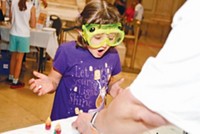Advertisement
Grab your lab coat. Let's get started
Welcome!
Welcome!
Create an account below to get 6 C&EN articles per month, receive newsletters and more - all free.
It seems this is your first time logging in online. Please enter the following information to continue.
As an ACS member you automatically get access to this site. All we need is few more details to create your reading experience.
Not you? Sign in with a different account.
Not you? Sign in with a different account.
ERROR 1
ERROR 1
ERROR 2
ERROR 2
ERROR 2
ERROR 2
ERROR 2
Password and Confirm password must match.
If you have an ACS member number, please enter it here so we can link this account to your membership. (optional)
ERROR 2
ACS values your privacy. By submitting your information, you are gaining access to C&EN and subscribing to our weekly newsletter. We use the information you provide to make your reading experience better, and we will never sell your data to third party members.
Education
Newscripts
Science Friction With Bob Wolke
by Science Friction with Bob Wolke
October 1, 2007
| A version of this story appeared in
Volume 85, Issue 40
To paraphrase Kermit the Frog, it's not easy being a chemist.
Upon hearing what you do for a living, how many times have you had a person blurt out, "Oh, chemistry was my worst subject!"
I'm always tempted to reply, "No, your chemistry teacher was your worst teacher," because I'll never relinquish my conviction that chemistry can be taught in an enlightening and gratifying way to almost anybody at any level.
Or people may wander away as soon as possible without actually bolting, convinced that there couldn't possibly be any topic of mutual interest upon which to base further conversation. Not that I blame them, because I myself have too often had to escape from people who can talk about nothing but their own interests. Certain sports fans, for instance.
It's worse when you're a professor, as I am. Everyone wants to tell me what college their kids are attending or applying to, and how smart they are. (Like the children in Garrison Keillor's Lake Wobegon, they're all smarter than average.) I'm supposed to be fascinated by this information because, you see, it's about colleges and that is my presumed single interest.
Few people understand what a university professor does. Once, when the local teachers' union was on strike, I was asked if I was working. And at a cocktail party populated mostly by middle- and top-management types at corporations like U.S. Steel and Westinghouse, I was asked how I would feel if my university "transferred [me] to another university."
Worse yet, my research field was nuclear chemistry, so I frequently worked alongside nuclear physicists, some of whom were prone to asking me questions such as, "What can I use to remove hardened epoxy cement?" (For this I got a Ph.D.?) "Nothing," I replied. That one was easy.
But when I was working at General Atomic in San Diego and sharing an office with another nuclear chemist, a physicist barged into our office one day asking, "How much does a cubic foot of paraffin weigh?" Figuring I'd teach this wise guy a lesson, I promptly said, "Fifty-four pounds."
"That's about what I thought," he said, and turned to walk out.
"Wait!" said my office mate, shooting me a reproachful look. Reaching for his "Handbook of Chemistry and Physics," he soon found the density of paraffin and, after three or four minutes of slide-rule pushing (this was in the awkward years between abacuses and calculators), announced with not a little dismay, "Fifty-five pounds!"
After the physicist left, my chemist colleague asked me, "How in the world did you know a thing like that?"
"I didn't," I said. "But he was so sure that I carry stuff like that around in my head, I figured I'd string him along. I guessed at about 0.9 g/cm3 for the density of paraffin (after all, it floats) and 60 lb/ft3 for water (it's actually 62.4). And 0.9 times 60 is 54."
Clearly, keeping ballpark estimates like that in one's cranium can come in handy at times, but instead of that, my advice to my fellow chemists is to learn the best ways to remove several common stains from fabrics. Nuclear physicists aside, that's what most people will ask you as soon as they find out you're a chemist. When you tell them how to remove the stain, they will be secure forevermore in their conviction that treating stains is what chemists do.
While chemistry is generally perceived as serious business, funny things do happen on the way to the lab or classroom.
At the University of Pittsburgh, the freshman chemistry students are divided into weekly "recitation classes" of about 20 or so. At the end of each session, a 10-minute quiz is administered.
Near the beginning of one semester, a colleague of mine announced in his idiosyncratic manner, "Okay, kiddies. It's time for our little quizzie."
Apparently, the quiz was difficult, and while leaving the room, a student stopped and said to him, "Boy, if that was just one of your quizzies, I can hardly wait to see your testies."
Realizing what that sounded like, the student ran out of the room and is probably running still.
Yes, indeed. Chemistry can be fun.
In future columns, I will explore some of the awkward and/or amusing incidents that happen at the ragged interface between science and the rest of the world. Examples are welcome. Please send them, with your name and address, to sciencefriction.wolke@gmail.com.





Join the conversation
Contact the reporter
Submit a Letter to the Editor for publication
Engage with us on Twitter